#media analysis blog
Text
Creating a burner account to post textually unsupported interpretations of stories I wrote myself and then call myself out over them.
2K notes
·
View notes
Text
mentioning LOST's church ending got me riled up about the racism in LOST again lol. i obviously am aware that some actors just did not return to production for possibly other reasons, but also especially in the case of harrold perrineau (michael dawson) he felt like his character (and walt, his son) was treated like shit by the writing. and he was absolutely right. i've already made posts about this (will try to dig them up later), but michael was treated absolutely bullshit and unfairly wrt the story. michael betrayed them and killed two people, yes, but what did he do it for but to protect his son? he felt like nobody gave enough fucks about walt and there was some truth to that claim. his whole character arc is about being a dad to walt and their improving relationship over the course of being stuck on the island, so of course he would do that. it just makes sense.
which is why i don't think it's all that fair to punish him for it immensely in the narrative. harrold perrineau said it himself that he didn't want michael and walt to be another case of the absent black father stereotype [citation needed, i'll look for it but he said it in an interview] yet that's what he ended up being anyway. after his and walt's escape from the island, apparently walt cast him away because he doesn't agree with what his father did—which i actually think its interesting to explore: walt disagreeing with michael's actions and trying to grapple with it, but i don't think separating him from his dad was the best writing choice to make. walt is being punished for caring about his son by making his son be the one to cast him away. you can argue it's supposed to be tragic, michael is supposed to be a tragic character, but with the context surrounding michael's character? there's better ways to make his character be tragic than this.
which brings me to his next punishment. i was happy to see michael again on the kahana (just happy to see him in general), but it didn't last long when he gets killed, sacrificing himself to prevent/prolong the kahana's explosion from happening. (put a 📌 on this bc it's similar to how sayid dies and we'll come back to that later.) michael dies here and walt doesn't know about this. and then michael joins as part of the whispers, his soul trapped on the island (presumably forever) and that's why he's not in the church ending.
i'm gonna be frank. michael being trapped on the island because of his guilt or remorse or perhaps repenting for his sins is just bullshit to me. a lot of characters seen in the flash sideways and in the church ending are characters who've done "bad things". it's bullshit to have michael be the only one doomed to pay for his misdeeds forever. his misdeeds for... killing two people. not that killing two people is Nothing, but moreso if you examine the circumstances it's hardly anything to be damned eternally for.
remember the 📌 we had wrt sayid and michael? both of them died trying to prevent an explosion from reaching everybody else. which makes this more egregious imo. i can say 1000 things about sayid's arc (points to url), but this is about michael and not him, so i'll just focus on this: sayid was grappling with "being a bad person" for torturing and killing so many people. he worked as an assassin for ben. and yet, somehow, you're telling me sayid is not being damned eternally for his misdeeds but michael is? if you don't see the BS in that i don't know what to tell you.
i'm also aware why some characters don't appear any more re:conflicts with their actors (or just availabilities or other reasons for declining to come back), but even then arguably any conflicts with harrold perrineau stemmed from a justified place because of how michael was treated.
i think mr eko had a more dignified arc (he's one of my fav characters, thematically speaking) and honestly he had some of the rawest shit i've ever heard:
I ask for no forgiveness father for I have not sinned, I have only done what I needed to do to survive. A small boy once asked me if I was a bad man, if I could answer him now I would tell him, that when I was a young boy I killed a man to save my brothers life. I am not sorry for this, I am proud of this. I did not ask for the life that I was given but it was given none the less, and with it I did my best.
but despite this it doesn't change the fact that his absence in the church ending is very noticeable. he had meaningful connections with charlie, with locke, and interestingly like michael he kind of parallels sayid but this time thematically through their arcs. sayid is constantly burdened with feeling like he's a bad person and resigning to it as some sort of self-fulfilled prophecy, but mr eko is very firm about how he sees himself as not necessarily a bad man, just a man whose hands were forced because of the cards he was dealt. i wish we could have seen a more direct parallel between them, because it would've been interesting. back to the main point: i think it's such a missed opportunity for mr eko to not be here. especially since even after his death, hurley was able to communicate with his ghost, showing that he still had connections with his fellow losties even long after his death.
ana lucia being "not ready to move on" is interesting. but ultimately you can't help but raise a few eyebrows at it anyway. you can argue that, unlike mr eko she died an unresolved death, but most of the LOST characters died with an unresolved death. (she was killed early.) that's the whole point of the sideways segments. so what makes ana lucia so different from the others? yeah she killed shannon, but that was completely a freak accident. her people (the tailies) were being picked off one by one by the other so she was understandably on edge. she was kind of a hated character but i think a lot of it is just racism and misogyny combined tbh. (LOST is...notorious for a lot of misogynistic character writing decisions.) ana lucia was just as complex and morally "ambiguous" as the rest of them. i find the decision to make her corrupt in the sideways segments interesting (negative). cz like, there was never any indication she was like this in real life. what does that corruption symbolize? because obviously that corruption is a key to why she "can't move on yet". what exactly is she supposed to be repenting for? they hinted at a possible direction her arc is going towards before killing her off, ie. her ultimately choosing not to kill "henry gale" because she no longer wants blood on her hands. again, in a way, she's just like sayid! someone who decided they'd turn away from ceaseless violence. only right afterwards she got killed. so what does she need repenting for so much that she's left out of the church ending? much to think about.
i don't really know how to conclude this post. but my main point is that the lack of these characters during the church ending is and has racist implications. (again, i understand the casting issues, but it's still a writing decision you can critique as a viewer at the end of the day). i'll try to find the old posts i made last year abt michael and mr eko and their parallels to sayid and link them here (and self reblog).
edit: go read/look up "burn it down". it details a lot of the behind the scenes mistreatment of the staff (including racism and sexism), including actors and writers. the quote from an interview from harold perrineau that i mentioned was also linked in a reblog. (post link)
#op#lost#lost abc#abc lost#lost 2004#<- have we agreed on a main tag yet#michael dawson#mr. eko#ana lucia cortez#meta#analysis#media analysis#church ending#//#lostposting#<- my tag for LOST rambles on this blog
94 notes
·
View notes
Text
I usually try to stay in my lane most of the time (mostly bc I am far too old for fandom drama) but what the hell, it's friday, let's put that lit degree to use:
the way people are playing morality politics with fiction is really starting to genuinely irk me and I think some of the responses to ascended astarion are a perfect example of why this type of thinking is actually hugely detrimental to one's ability to meaningfully engage with fiction and also to the future of art.
astarion is one of the most well-written complex characters I've seen in recent years bar none (and I'm clearly not alone given the explosion of his personal fandom lol) and he has a truly compelling, emotionally resonant character arc whether you ascend him or not
If you keep him a spawn, you get a deeply touching, realistic character's journey to healing and personal growth where he learns who he is after the experience of his trauma and depending on the player's choice, explores his relationship to sex, romance and intimacy
If you ascend astarion, you get an equally emotional and well-rounded character arc where he chooses the power that allows him to have the desperate freedom and safety he's wanted, but in the process eschews any hope of real healing or personal development, and again, depending on the player's choices, restarts the cycle of abuse by taking cazador's place.
These options offer vastly different paths for the character and experiences for the player, but while yes, ascended astarion is the evil ending, and yes, ascending astarion is a tragedy, and a fucking incredible one (not only do you have astarion reigniting a circle of abuse but you have the narrative weight of KNOWING he could have actually overcome his trauma...hats off to the bg3 team tbh) but that does not mean ascending astarion MAKES YOU AS THE PLAYER EVIL
Ascend astarion because you love tragic story arcs, ascend him because you want to indulge in a master/slave vampire fantasy, don't ascend him because you want a healing character journey, don't ascend him because you want a sweet romance; all of these choices carry the same moral weight for the player, which is to say, none, because they are an exploration of fiction.
I know I'm saying this to the villain fucker website but it bears repeating; just because someone wants to engage with evil, fucked up characters or content does not mean they support evil acts in their real life, and furthermore, exploring dark, taboo or tragic concepts safely is part of what fiction is for. It enables us to look at those things from a distance, work through difficult feelings and develop greater understanding of what makes our fellow humans tick — and before you get it twisted there's also no moral issue with exploring fucked up media bc you're horny or just, because. You can take it as seriously (or as sexily) as you want.
It's starting to really concern me how many people not only do not get, but are violently opposed to this concept, because equating what someone likes in fiction with their real life moral code and actions is an incredibly dangerous and let's be honest, immature way of thinking that not only stunts your ability to engage with fiction but ironically, hampers your ability to deal with complicated issues and emotions in real life.
I don't know what's driving this trend (though purity culture is certainly playing a role) but it's definitely something that's not just impacting individuals but contributing to the commercialization of art, where we get games and stories and tv shows and books that regurgitate the same safe, mass marketable plotlines and character archetypes over and over and over again so corporations can squeeze out as much profit as possible.
Anyway, remember kids: There's no such thing as thought crime, reaching for morally pure unproblematic media is directly contributing to the death of art, and this is why funding the humanities is important.
#so...yeah#idk man i have thoughts and feelings#and i love astarion so much lol#astarion#ascended astarion#bg3#baldur's gate 3#fandom analysis#media analysis#fiction#a personal rant because i need to vent about this and i just recalled i have a blog where i can indeed do so lol#astarion ancunin
140 notes
·
View notes
Text
Poll: Solarpunk Topics to Write More About

So, I have decided to go back into blogging a bit more about Solarpunk - both as a genre and as a movement. But I now gotta ask you: What kinda Solarpunk stuff would you like to read more about in this blog?
#poll#tumblr polls#my polls#solarpunk#lunarpunk#worldbuilding#writing#fiction#media analysis#technology#blogging
66 notes
·
View notes
Text
"can't you guys shut up and stop complaining about the announcements and just have fun" i am having fun. i like complaining
#it is not 'problematic fandom' for people to have negative opinions. hope this helps!#taps the sign. it's my blog!#personally getting all my complaining out of the way lets me be pleasantly surprised when things grow on me#also... i'm sure some of the discourse will be stupid but like...#everyone going la la laa i'm not going to listen to any negative opinions on the game when it comes out#it really feels like people are trying to label serious critical commentary as 'discourse' already#like yeah. sorry. there will be 'discourse' about racism and ableism because the writers have always been bigots. sorry#and that kind of criticism aside. yes there will be some silly discourse. but like...#in every media ever created since the dawn of time people have argued over their opinions on x character or y plot point#and some of us enjoy critically engaging with our games and interacting with the broader sphere of opinions and analysis.#mine
45 notes
·
View notes
Text
I don't mind when historians are opinionated. In fact, I find it fun to dissect their arguments. But it bugs me when an opinion is presented as fact, or if the lens the author constructs isn't acknowledged as a lens through which history is viewed. Like so:
For much of the early Roman Republic, the patricians were essentially a ruling elite, and the plebeians had little leverage in the government’s mechanics. They understandably grew tired of being oppressed, but instead of resorting to violence, the plebeians peacefully extricated themselves from their weak position in Rome. They abandoned the city and left it to the patricians. It was essentially a strike, but it enabled both parties to reach a compromise that created a more equitable power-sharing agreement without the use of violence.
I don't know much about the secessio plebis, but I'm skeptical that it happened without any violent retaliation from the ruling class. Just look at the history of modern strikes. And this paragraph elides all the uncertainty we have about what really happened over about ~400 years.
(The only citation here is a short passage in Plutarch's Life of Coriolanus, a few chapters after the flaming ghost phallus. It does not seem to have occurred to this writer that Plutarch can be wrong. Or that Livy exists.)
Tiberius’ brother, Gaius Sempronius Gracchus, resumed his brother’s populist mantle, and he successfully continued his reforms and created a subsidized grain programme for all Romans. However, in 121 BC, his faction and the opposition met in a murderous confrontation that left Gaius dead.
That's all we hear about Gaius Gracchus. Full stop. The lack of additional detail prevents me, the reader, from understanding who started the violence, whether extreme measures were justified, and who (if anyone) was in the right. It feels like the author references him as part of the troublesome tribune/class conflict narrative, but doesn't explain why the example supports his argument. Or not. I don't know, because we aren't told.
Politicians learned how to purchase the electors’ allegiance, either by promising welfare programmes to benefit the commoners, directly transferring wealth to the voters or providing spectacles and feasts for the masses. For instance, in 99 BC, Lucius Cornelius Sulla unsuccessfully campaigned on his military exploits, but when he later canvassed on a platform of unprecedented free games, he was easily elected. The Roman voters weren’t the only ones enjoying inducements of various kinds. Politicians were also on the take.
This makes ordinary Romans look pretty shortsighted and self-centered, doesn't it? And it makes politicians who promise to improve the lot of the poor look like they're corrupt and unprincipled, rather than altruistic, even if they aren't breaking the law by proposing those reforms. (Even Cato the Younger passed a grain subsidy at one point!) It's strange to see land redistribution, food for the poor, electoral bribery, the (actually quite traditional) public games, and political bribes/extortion all get lumped together like this.
For comparison, I'm reading this as a US American who grew up hearing "Support our troops," but supporting said troops really meant "wear flag pins and don't protest the war in Iraq." Anyone who actually wanted to improve soldiers' lives, e.g. by addressing public healthcare or poverty, was accused of enabling "welfare queens" who just wanted Bread and Circuses: US Edition. So when I see descriptions of Roman politics that remind me of that, I get very cautious.
Who is this writer, anyway?
Marc Hyden is the Director of State Government Affairs at a Washington DC-based think tank, and he is a weekly columnist for the Newnan Times-Herald and Albany Herald. Marc graduated from Georgia State University with a degree in philosophy.

Ah. (From Hyden's website and Media Bias Fact Check)
I would've thought a philosophy degree could teach someone how to support their arguments and read sources critically. But you're entitled to your opinion, Mr. Hyden, and I'm entitled to switch to a book written by an actual historian.
(Book excerpts from Marc Hyden, Gaius Marius: The Rise and Fall of Rome's Saviour.)
#i usually try not to be mean to anyone but ancient romans on this blog. but i figured this might be useful for some folks#as an example of how to read carefully and spot bias#and an example of how modern people may try to use ancient rome as a precedent for their own political agendas#marc hyden#gaius marius: the rise and fall of rome's savior#jlrrt reads#jlrrt essays#literary analysis#media literacy#critical thinking
27 notes
·
View notes
Text
Wild to me that there are ship wars for Interview With The Vampire when, as a teen, The Vampire Chronicles were some of my first exposure to non-monogany.
Obviously it wasn't perfect. I mean, Lestat/Louis/Claudia is a textbook example of "relationship broken, add more people (oh no now it's even more broken)," and "not every Vee should become a Triad." If you've ever experienced the drama of an incestuous non-mono community where everyone's dated everyone... those books all get a little too real. There's backstabbing, jealousy, domestic abuse, and more murder than I personally prefer in my own polyamory 😅
But there's also "we belong to each other, why would anything we do with other people affect that?" There's "let's find out what it looks like to be with someone for the rest of my life (or theirs)." The idea that relationships have value even if they don't last forever. That romantic relationships aren't inherently more important than platonic ones. The idea that you can hold multiple people in your heart at the same time, that there's room for everyone. That the relationship escalator (dating > marriage > kids > death) isn't the only (or best) way to have significant, committed relationships.
They introduced the concept of comet relationships to my baby brain more than a decade before I would learn the actual term--those people you don't see for months or years but as soon as you see them it's like no time has passed (a personal favorite for my ADHD ass).
Like, when I say those books changed my brain chemistry, I mean that my silly little self-insert Mary Sue OCs went from "marry my fictional crush and be with them forever" to "what if they only saw each other once or twice a year but it was still incredible" and "what if she was married but also had a vampire lover and everyone was chill about it (and also she was a rock star)" and "what if they all lived in one big house together" and/or "what if lived by herself and found that fulfilling" and "what if men and women and ???" That shit was formative. Some of those little daydream OCs live in my brain to this day.
-
Idk man. I don't have much patience for ship wars anyway (and I'm scratching my head about people getting upset about canon relationships being, you know, canon). But with TVA especially, my brain simply cannot comprehend it in a monogamous framework.
#sorry to accidentally write a manifesto. like I said this shit was FORMATIVE.#and I'd honestly kind of forgotten how much until the show came out.#kind of afraid to use the main IWTV tag but it's part of my blog filing system so 😅#interview with the vampire#the vampire chronicles#polyamory#non monogamy#personal#media analysis#fandom discourse#relationship anarchy#water logs
49 notes
·
View notes
Note
i know for sure if Dawnpelt was a tom everyone would want her dead and no one would bat an eye, but bc she is a lil messy girl it's 'mean spirited' and 'too intense'? okay lmao 👍
HUH??
#i think this is a good point to stop responding to asks about the dawnpelt situation!!!!#theres a response from the og anon clarifying what they meant which i'll be putting in the replies of the original post#and a really lovely character analysis i'll definitely be responding to#i dont want to clog up my blog too much with these asks so i'll stop responding to asks until after i post the next moon#if anyone wants to disagree with this person you can do so in the replies#chitchat#ask#for the record. i disagree with anon. first of all i think people generally think dawnpelt is being an ass. no one is defending her actions#secondly i think people are historically way harsher on female characters in media#for example think of ashfur's treatment by fans+authors compared to squilf's or dovewing or even canon dawnpelt
49 notes
·
View notes
Text
i've had it: a Web-focused analysis of episode 8
my babes, my babes, what can I say?
Over the years I’ve seen a lot of people saying that in “The Patrol” aka “The Last Patrol” Web is depicted as “trying to get himself taken off the patrol ”. Many long years I have rested, but now i have, in all essences, Had It with that take in light of my recent brush with death (not really, but it adds some gravitas right?).
It's Everybody's right to their own opinion, but I am here to host a Formal Rebuttal of this pervasive interpretation, because I never (even in my pre-webgott days) read That Scene as such, and I feel that this reading makes even Less sense within the full portrait of the episode. I will defend my stance with appropriate screengrabs, but unfortunately due to Max being made singularly of butts and capitalist dupes I am not able to screengrab anything that isn’t already grabbed or put on Youtube. I have much, but not Everything, so bear with me.
(This will not be a litigation of why the episode chooses to detract in myriad ways from the historical record, but suffice it to say that this episode makes a lot of choices re: who was on the patrol, why they were on the patrol, and who showed up when that are not Exactly accurate but does suit the story that they were endeavoring to tell. I’ll leave it at That.)
So, let’s get into it.
I. What is this episode about?
I spoke “briefly” but not that articulately about why episode 8 is my favorite episode on my good friend Sarah’s podcast last year, and I still stand by many of my reasons for doing so, but I’d like to highlight one element in particular.
This episode is coming hot off of the heels of one of the most harrowing episodes we’ve seen up to this point, “The Breaking Point”, and in that episode we see not only exactly what it has cost our guys to be in the Bois Jacques for so long, but we also see how this has in many ways made their bonds with each other even closer. They leave that conflict feeling tired, overworked and underfed, and incredibly protective of one another, and because we the audience got to see that we in turn feel protective of them as well.
Which is why I find the choice for Web being the main protagonist of the episode so inspired.
We are thrust immediately from this harrowing experience, as well as the lived-in dynamic with our main guys, into following a guy who disappeared from the show entirely in episode 5, which not only makes us suspicious of him but it runs up against our instincts to bond with our protagonist. We know immediately, even if we’re on a first or second watch, that Web was not in the Bois Jacques because of the visual language used to characterize him as well as his own opening narration, and as such we immediately don’t want anything to do with him because we too feel protective over our guys who were in the actual fight and we don’t want to waste our time with guys who don’t get it.
Trust and belonging. Those are the core themes of the episode in my opinion, and we see it with several characters (Lt. Jones and Web are in much the same boat because they have no trust and they don’t belong and so they have to earn them both back; Vest is trusted but he doesn’t belong not only because he’s not a guy the audience is that familiar with but because his job in the context of the show removes him from being that close to our core group). The episode is as much about those things as it is also about combat weariness, how our main guys are acclimating to the idea of the end being near, as well as the ultimate brutality and inhumanity of war on a micro level (Web’s ending monologue is a great example of this, and read in conjunction with Sink’s decision to try and send the patrol out again is a pretty good indictment of the depersonalized and mechanic way war works for a lot of people).
So, in essence, this episode is about getting the other guys, as well as the audience, to trust Web.
II. Web is a Good Character (you guys are just Mean)
How do you get the audience to trust your character (even if they don’t like him)?
They manage to accomplish this at least in part by trying to show us that even if his plans are lackluster his intentions are good, such as his initial - albeit inappropriate - happiness at greeting everyone, his reveal of who was being initially selected for the patrol, and his successful attempt to get Malarkey taken off the patrol. We see a few times that his actions have consequences, but for the most part we are able to Understand the train of thought that informs the choice. He sees that the other guys are distrustful of him and no longer want him around due to his absence from the previous episodes, something that clearly throws him off balance, and so we can progress through episode 8 with his primary motivation being to get the core group to trust him again and as such regain his sense of belonging.
We see it right away in the episode, where he greets the other guys only to be quickly dismissed and chastised for assuming a familiarity that is no longer there, and again we can infer from Eion Bailey’s performance that he not only understands that he’s made a mistake but is already internalizing that his decision to remain at the hospital was most likely the incorrect decision.

This goes directly into the motivation for telling his fellow platoon members that some of them have been selected for a patrol that most likely will be disastrous, which we can clearly see he doesn’t want to do but does in order to attempt to gain his footing back within their ranks.
This isn’t entirely successful, as the other guys seem to read it more as Web being first annoying at not wanting to tell them and then secondly unreliable because he told them in the first place. And again, we can read in Bailey’s performance that he quickly realizes that regaining his standing is not going to be as simple as he thought that it would be.
His next attempt at ingratiating himself is tied inextricably to the issue at hand. To reiterate, we the audience as well as our characters of interest have become protective over one another in the wake of the previous episode, and one of the characters who comes out of “The Breaking Point” particularly fragile is Malarkey. We have context for his emotional placement that bleeds out from the previous episode, and a lot of visual weight is given to the fact that Malarkey in particular is exhausted, depressed, and would benefit heavily from a brief respite from being on the front lines. Other characters express this sentiment In Webster’s Direction, and in search of another way to endear himself to the rest of the platoon he sets out to kill two birds with one stone by i. Getting Malarkey off the patrol ii. Getting Lt. Jones the experience he needs to hop up the ranks and go away.
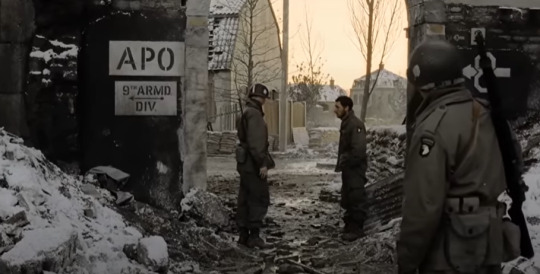
This attempt is successful, but backfires again when Martin is placed in charge of the patrol instead of Jones. It is possible Web should have anticipated that due to the other man’s inexperience they wouldn’t have let him lead it to begin with, but we the audience should ideally still be interpreting at least the initial intention of the decision to be a good one. He sees that the other guys want Malarkey off the patrol, so he gets Malarkey off the patrol.
This brings us to the moment in question.
III. Let’s Break it Down: Part Un
INTERIOR - A ROOM IN lol i’m joking but what if i did do it like that
It is quickly revealed that Web’s plan has failed, at least in part. Martin has been appointed to lead the patrol, and is clearly no more eager to do it than anybody else is (except Lt. Jones), and Web clearly looks remorseful towards putting him in Malarkey’s place.
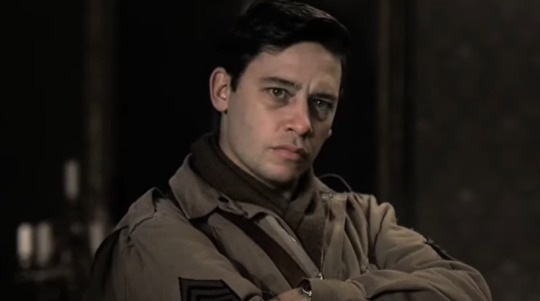
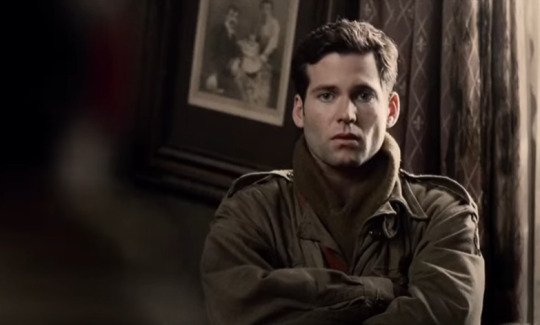
In an act of revenge he appoints Web to be translator, and Web is also not that jazzed about it but appears to accept it with a Tiny Little joke.

The scene progresses to planning the attack, and we get a few visual cues to indicate that this is a no good very bad idea and everybody hates it before the meeting ends and we hear Liebgott make a jab at Web’s attempt at a joke re: his German capabilities, to which Web gives my favorite reaction in the whole episode where he clearly wants to look directly at the camera like he’s on The Office and clowns his way out of the room.

Hard cut to everybody leaving the building, with a few of our guys in the background as Web moves into the foreground away from them (he wants to be with the cool kids but he’s Not one of the cool kids). We hear but don’t entirely see Grant saying the line “Webster. Tries to get out of everything”, but it’s loud enough that we can assume Web himself also hears this, and he has a small moment of looking back at them in response before he advances to address the officers.
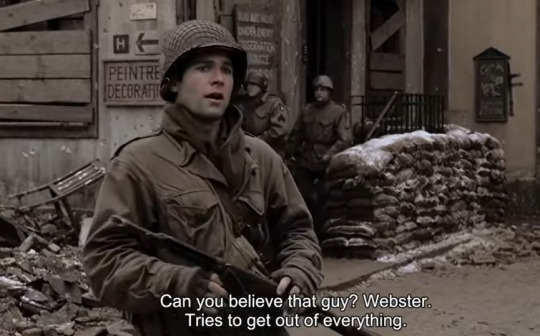
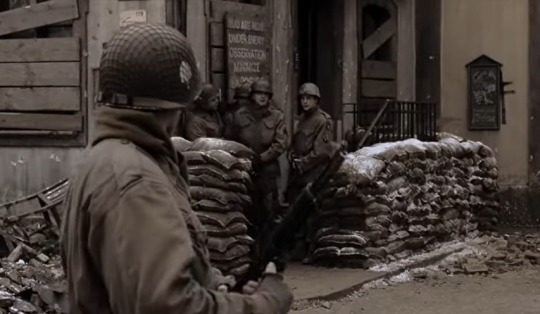
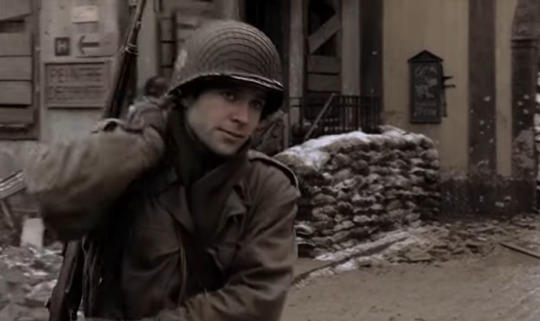
He points out that both he and Liebgott speak German, and we the audience infer that having the two guys who speak German on the same patrol would be a bad idea because both of them could get taken out and then the company would be shit out of luck. Speirs is quick on his feet, and as Liebgott, Grant, and Jackson pass by he stops them and tells Liebgott he can sit this one out. Liebgott accepts, winks at Web, and gives him a joking thanks.
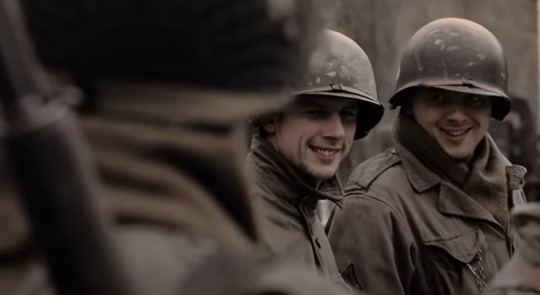
Web gives him a tiny half-smile, thanks the officers, and walks away, clearly not loving the fact that he’s going but not appearing resentful.
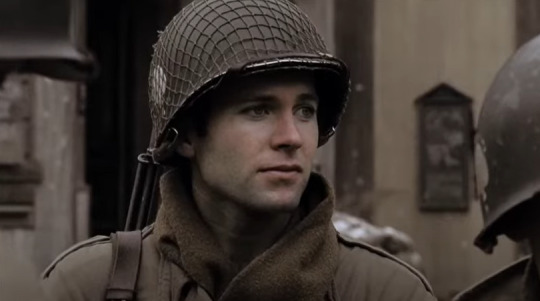
FINIS
That’s the scene of the crime. So, with this narrative context, let’s get to our second suspect.
IV. The Liebgott of it All
In black and white terms, the principal Antagonist to our Protagonist in this episode is Liebgott, even if we can all agree he’s a king and Web is Himself.
In Web’s intro to the episode he’s the character we see giving him the hardest time about being away from the company, when Web is gearing up to spill the beans about the patrol Liebgott is the one stirring the pot, and in the patrol meeting he’s the one making fun of Web for downplaying his German. Liebgott gets more weight in this episode than he has in any previous episode, and we are meant to extract from their numerous interactions that even if Liebgott is a guy that has been mostly on the fringes throughout the show up to this point he is going to be the one that makes the ultimate decision about whether or not Web will be accepted back into the group.
We have an automatic trust for Liebgott because we’ve seen and known him from the very first episode, he’s had individual moments sprinkled throughout the show, and narratively we’ve mostly seen him displaying his competency, humor, and principles. These are all things that the audience is missing in a relationship with Web, so like the other guys we’ll trust Liebgott’s assessment of Web more than we’ll likely trust Web’s intentions at face value. This gets tricky, because Liebgott is not immune to his own pettiness, and even if he Was capable of reading Web’s actions in good faith he is still going to have reservations because up to this point we have no reason not to think that Web stayed out of the fight On Purpose.
So, Liebgott gives Web a ton of shit throughout the episode, and the audience can take that as an indication that Web is not worthy of regaining his place in the group. Web also seems to realize this. If he wants to be back in the mix the person he’s really going to need to impress is Liebgott. As it goes on Liebgott’s exact intentions with Web are a little dubious, because at some points he does seem to internalize that he may be being too harsh or too resistant on Web. After Web gets outed as having told the other guys about the patrol Liebgott appears reserved, not taking pleasure in his embarrassment.
And after hearing Chuck’s pivotal line we can hear Liebgott brush it off with a “whatever” as he clearly looks towards Web in the foreground.
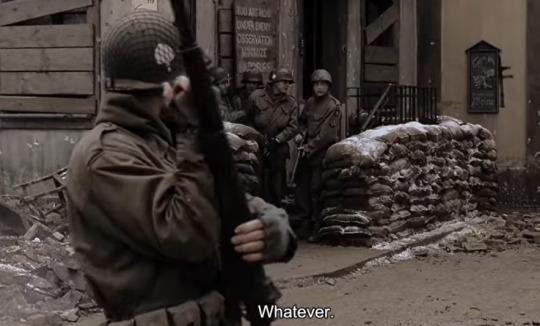
There are things at play in regards to how Liebgott is feeling about his own pettiness towards Web, but whatever reservations he has are not powerful enough up to this point that we take too much notice.
This, Web’s knowledge of it, as well as the throwaway line from Chuck, all inform the decision to approach the officers after the patrol meeting.
V. Let’s Break it Down: Part Deux (boogaloo électrique)
What We Know: Web is ostracized from the group and is trying to get back in, Liebgott in particular doesn’t want Web back in the group because he’s missed a formative event for the company and feels he doesn’t deserve it, and there’s a patrol that nobody wants to go on because They’re Tired looming in the distance.
With what we know (above), what we know happens in the scene (see part III), who these characters are plus their narrative intentionality (parts II and IV), and what the episode is presumably supposed to be about (part I), gives us a pretty clear indication of what Web’s intentions are when he approaches the officers. Web wants to be back in the group, Liebgott is the one he has to convince, and to put a cherry on top he clearly hears Chuck talking smack by saying he tries to get out of everything.
He prompts the officers by pointing out that Liebgott speaks German as well, and we Must assume he does this with the understanding that there’s no way they would take him off of the patrol over Liebgott.
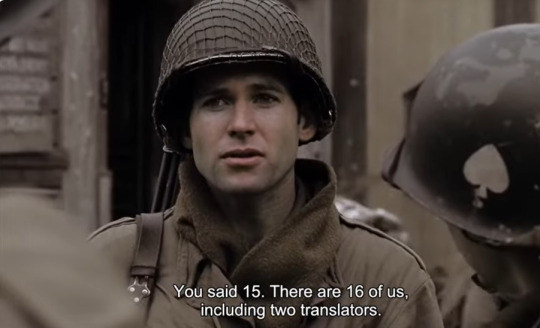
Though we’ve seen Web make plans and have them backfire we can’t infer that he’s that stupid just based on what the show has told us about Web thus far. Socially awkward? Yes. Stupid? Not really.
There would be no way he’d think they would take him off and keep Liebgott on, and he already approaches with the knowledge that if he does earnestly try to remove himself from the patrol that would forever damage his standing in the company and he would never, ever be able to get back in with the core group. You know, that thing that’s motivating everything he does in the episode.
It wouldn’t make sense in any measure for Web to be going up to them trying to get himself removed. It wouldn’t flow with his actions in the episode, his motivations, Liebgott’s mini-arc of excluding him, and it certainly would not serve the overarching themes of the episode which are Trust and Belonging.
The perfect button to this conflict is the wink that Liebgott gives Web after being told he can stay behind. There’s a brief moment where he Just looks at Web, and there’s a definite understanding that moves between them that this isn’t the end of the road for Web’s attempts to get back in but that an Important Step has just been taken.
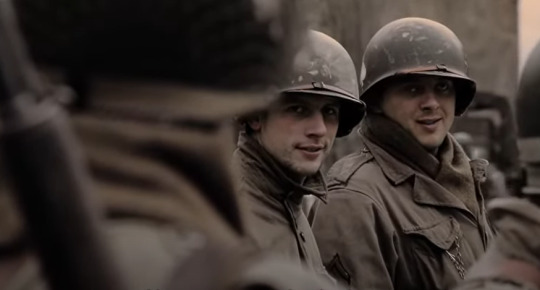
Web gives him that half-smile, accepts that his work is not done, and they move to their separate corners.

The culmination of these sort of swirling themes comes during the patrol, when we get a few different moments of Liebgott waiting across the river displaying clear alarm at what he’s seeing.
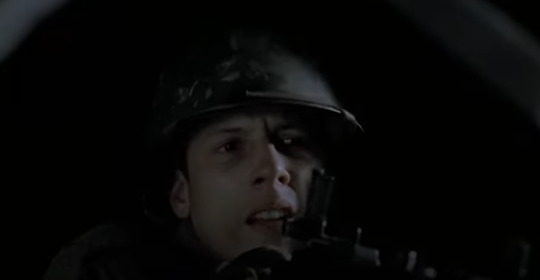
Given our context for Liebgott in this episode, and his primary relationship within it being with Web, we can assume this is the moment his feelings about letting Web back into the fold turn. He sees Web took him off the patrol, is now in a precarious position, and as we’ve had a few flashes of his backtracking his own pettiness towards Web we can assume this is the final straw.

He was fine holding out on Web up to this point, but he doesn’t actually want anything bad to happen to him just because he indirectly influenced Web into proving himself (even if Web was always going to be trying to prove himself).
So with the completion of the patrol two big things have occurred: Web has weathered a harrowing experience that cost the life of a beloved member of the company and as such got a small, small taste of what the rest of the company experienced in the Bois Jacques, and Liebgott has come to accept that Web’s intentions are good and he can be trusted again.
After this occurrence we see that at least as far as the other guys in the group Web is - for the most part - accepted back. Martin defends him against Cobb, and in that we can assume that the heavy lifting portion of Web's attempts to rejoin Easy have been successful. But the main character that Web, as well as the audience, is interested in is Liebgott. He's presented the greatest barrier to acceptance, and a lot of weight has been placed on he and Web's dynamic in the episode, so we have to wait and see how he will react to Web's newfound acceptance.
That leads them both perfectly to the end of the episode, where our visual cue to this is given: Web approaches the transport, Liebgott offers him his hand, Web takes it.
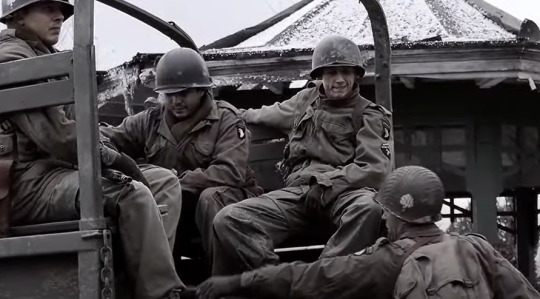
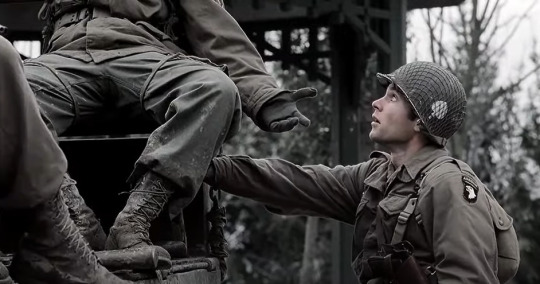
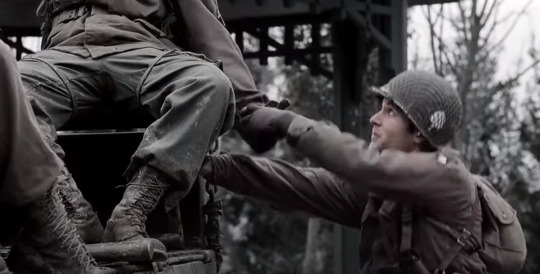
Poetic Cinema.
Web has regained trust, and once again he belongs.
VI. I've Had It
I own the fact that I’m feral about this episode and for the most part people don’t seem to like it that much, which is fine and I’m not here to convert anybody. Additionally, I own the fact that Web is my son and I think he’s hilarious and everybody else thinks he’s The Worst. However, I just don’t think that This particular criticism holds much water when we give it the actual reading that we’re meant to be giving it with the weight of the narrative, what we’re being told about individual characters, and the overall themes of the episode.
The truth is the truth, and we can’t All be champs.
Lol jk bc truly if you feel as strongly about this as i do (which seems doubtful lol) I am not anti-debate and I would welcome hearing why people seem so Deeply convinced of Web doing all of this just to try and get himself taken off the patrol.
(Answers I will Not accept are the kind that use Web being annoying as a basis for a read on his character motivations because girls that’s Not It.)
And so it is ~
#media analysis? on MY blog? it's more likely than you think#i think i was so haunted by the idea that i could die and people would still have this take that it propelled that i defeated my fever#band of brothers#david webster#listen lets clown on web for the Actual stuff he does that's not great aight bc This Ain't One#and i have been silent too long lol#now i'm going to dinner and i'mma get myself a Big glass of wine
92 notes
·
View notes
Text
YES i really enjoy watching random people i don't know dissect horror media i have never watched/read/played for several hours at a time NO i don't want to actually watch horror. we exist.
#written horror is ok sometimes. visual and audio horror is ok like mostly never. detailed dissection & analysis is ok all the time. we exist#trb.txt#media blogging#this post is directed at youtube ads. which keep showing me horror movie ads. please stop ‼️👎
31 notes
·
View notes
Text
It's really, really annoying when non-gangster focused but crime adjacent media, or media invoking organized crime tropes, decides to put in a second string mook who's a big, kinda of slow, cheerful thug with a wide chest and a nice smile, who looks great in a hat and suspenders.
Because I will immediately fall in love with him, and the media also immediately kills him off. 😭😭😭
#🎀💖#blog updates#character tropes#self ship#seflship#media analysis#fandom#remembering the first season of gotham#and so many others
29 notes
·
View notes
Text
i also just DO think that if you're like "oh those (lazy, vapid, brainless) people who only Consume Media" I am gonna be raising one hell of an eyebrow at you. like hey quick question where do disabled people fit into your mental model of all this. do you think it's bad if someone with a disability can only ever muster the energy to watch tv?
like disregarding all the weird viewpoint of art that goes into referring to it as Media Consumption, I just flat out do not think you're very kind to disabled people if you're getting mad about this boogeyman of someone whose only hobby is something you view as mindless. if you want people to be more active audiences of art, or if you want people to try more hobbies, that's totally fine! maybe you should post some resources to help people branch out more! but if your entire thesis is snidely saying that people who don't have hobbies you approve of aren't cool or good or whatever.... maybe you're just kind of an asshole
#narrates#i feel very passionately about this because a) im a media analysis blog and i AM disabled#and b) my fiancee is disabled. there are days where the only activity they can do is watch anime#i dont think its bad or lesser that they don't do much else. thats how it is sometimes.
78 notes
·
View notes
Text
Hi!!
I'm new to blogging, but excited to start! This is something I've been thinking about for a long time because I A) Love media analysis and would love to talk to others about it, and B) Love writing and think blogging is a good exercise to build skill.
As I'm sure you could gather, I really like podcasts. While I don't want to make this exclusively a podcast blog, my main goal is to start a Magnus Archives relisten. I'm hoping to get through two episodes a week, posting on Mondays and Saturdays starting on March 25th, though it's possible for life to get in the way and change the plan.
I want to share any analysis I have of the episodes in general as well as make a rudimentary avatar and entity catalogue, plus document early foreshadowing.
I am also planning on using this blog to write about my other interests such as comic books, writing, exercise, literature, tv, and more! Follow if you're interested, excited to see what you all have to share!
#the magnus archives#rusty quill#podcasts#tv shows#writing#exercise#intro post#introduction#blog intro#books#classic books#literature#analysis#media analysis#hi!! <3#the magnus protocol#tma#tmagp#the magnus archives relisten#tma relisten#relisten
25 notes
·
View notes
Text
job interviews are so fucking weird like "what do you do in your free time" girl how do I explain that I analyse childrens cartoons for fun without sounding like a complete psycho
#phineas and ferb#milo murphy's law#hamster and gretel#I hate being an adult fr#not that I would actually say I run a dwampyverse blog on tumblr bc that’s. nope.#but like. how do you even say you enjoy media analysis without sounding either boring as fuck or a little bit insane
126 notes
·
View notes
Text
media analysis is fun I just get carried away sometimes. I was watching hereditary and halfway through I thought “hm…sharp things seem to be a recurring theme in this movie.” babe sharp things are a recurring theme in many horror movies.
#hereditary#horror#ari aster#horror movies#media analysis#saw#not mentioned in this post but like. it is my saw blog.
21 notes
·
View notes
Text
Bro, sorry I’ve been so aloof and distant lately, I just found inherent meaning and wonder in something often derided as meaningless and discovered what true passion in art meant for the first time, yeah, yeah it was this whole thing
#(cheers to over a year of hyperfixation that upgraded to whoops first new special interest in 8 years)#and it’s like the weirdest thing to have become fixated on especially so deeply but the depth is there it’s there#media analysis#idk what to tag this as if you see it you see it#been neglecting every other blog to exclusively post on secret fixation sideblog for 8 months
38 notes
·
View notes